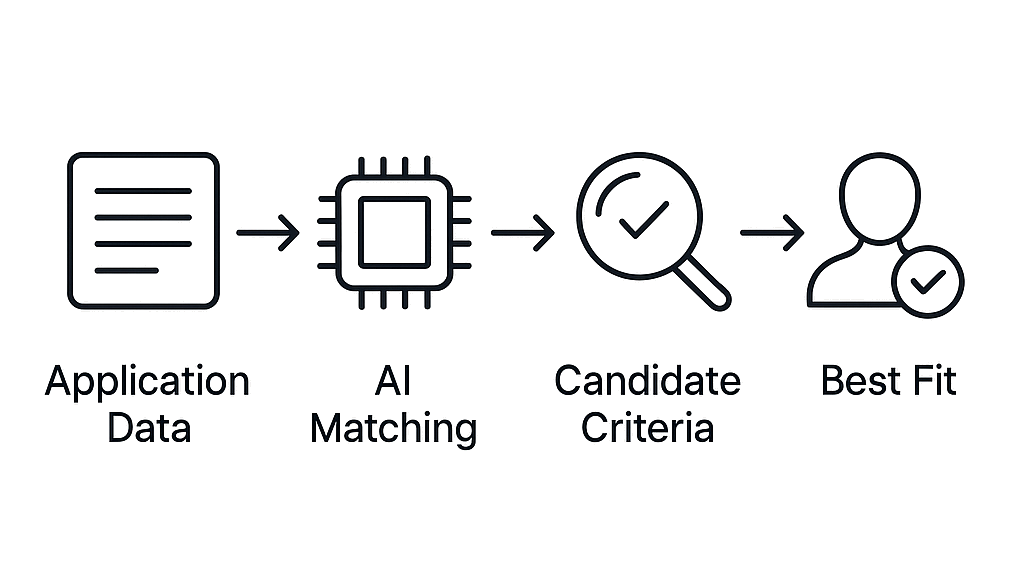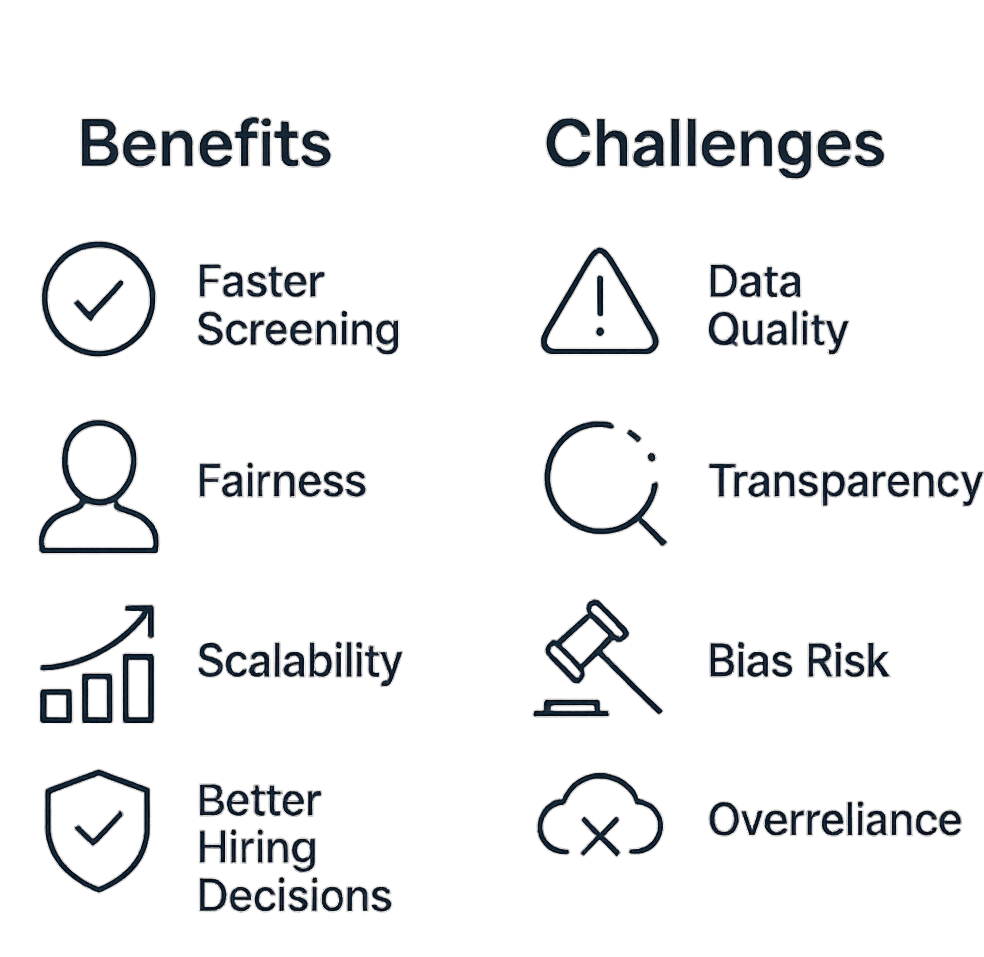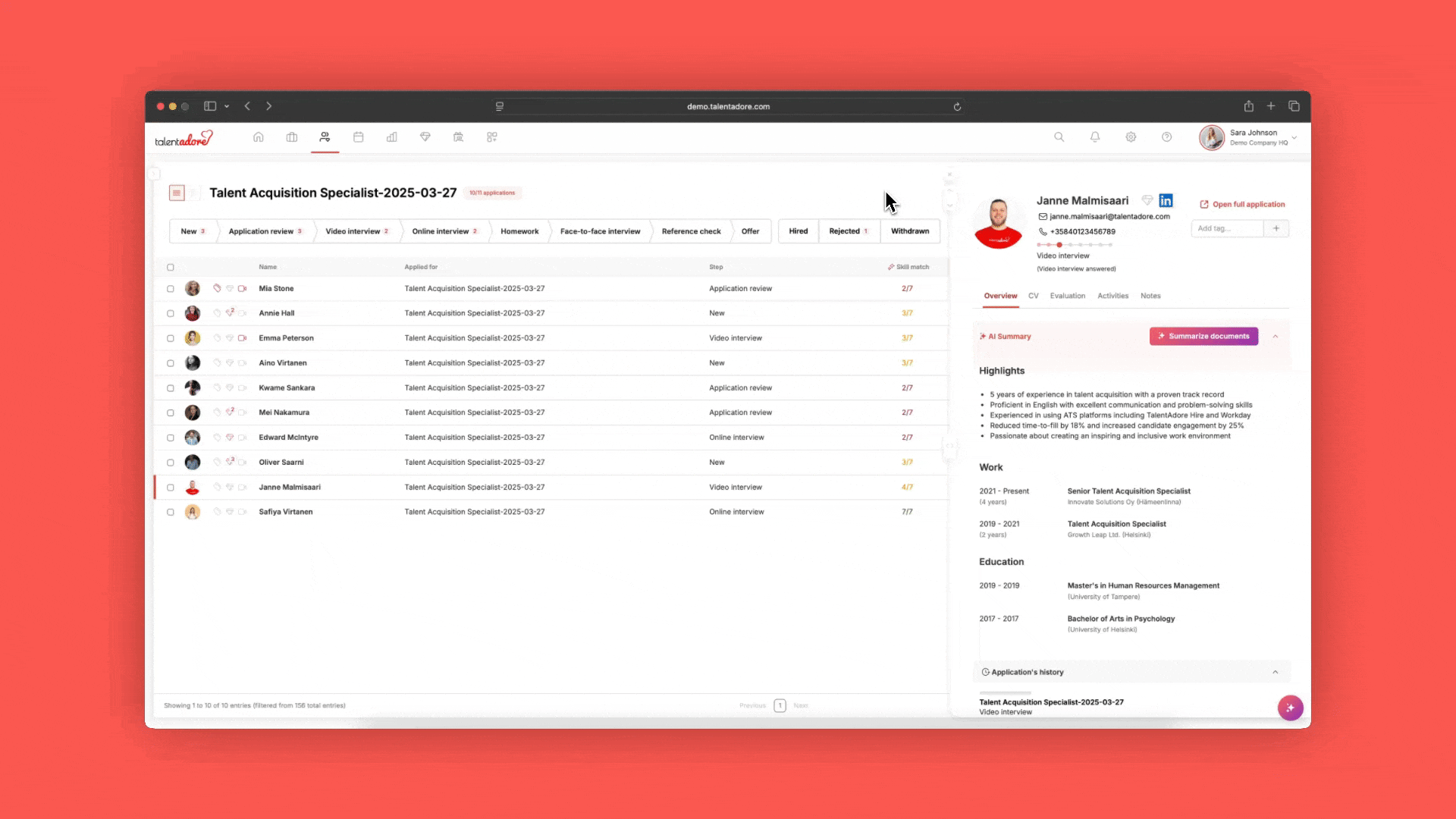Miira Leinonen
CMO
Passionate about creating compelling stories and enhancing the world of recruitment. Helping companies to improve their Employer Brand with modern recruitment methods and superior Candidate Experience.

Artificial Intelligence
As the recruitment landscape evolves, hiring teams are facing unprecedented pressure to process large volumes of applications quickly and fairly, without compromising on quality. AI matching in recruitment has emerged as a powerful tool for meeting these challenges.
By using artificial intelligence to assess how well applicants align with job requirements, companies can streamline hiring, reduce bias, and make better decisions based on real skills and experience. AI matching plays a vital role in enabling effective skills-based recruitment.
Instead of simply looking for keyword matches, advanced AI matching systems can understand context and meaning, making the process more intelligent and effective.
In this article, we’ll break down
AI matching refers to the process of using artificial intelligence to analyze and compare candidate profiles with job requirements. The goal is to automate and enhance the candidate screening process by identifying which applicants are most relevant for a given position.
This can include matching based on:

Instead of simply looking for keyword matches, advanced AI matching systems can understand context and meaning, making the process more intelligent and effective.
For instance, if you write that you’ve built dashboards in Power BI, the AI understands that you have data visualization skills—even if the job description only mentions “data visualization” and not Power BI specifically.

AI matching in recruitment can involve several technological approaches, including:
Example: A job description includes the term “customer support”. The AI scans resumes for candidates who have used that exact phrase. A candidate who writes “helped users with product issues” might be missed because the exact keywords don’t match, even though the experience is relevant.
Example: A job requires “project management” skills. The AI recognizes that candidates mentioning tools like Trello, Asana, or phrases like “managed product roadmaps” are a semantic match, even if the words “project management” are never used directly.
Example: Example: A candidate uploads a CV that says: “Proficient in Python, developed data analysis dashboards in Power BI.”The AI extracts structured skills like Python, Data Analysis, and Power BI, turning unstructured text into standardized skill tags.
Example: An organization has a history of hiring customer service reps with a background in hospitality. The AI, using past hiring data, recommends a candidate from the hotel industry—because the system has learned that this profile often succeeds in the role, even if it’s not an obvious match.
Example: One AI agent analyzes hard skills, another evaluates past job titles, while a third assesses cultural fit based on sentiment in the cover letter. These agents collaborate in real time to produce a single ranked shortlist for the recruiter, handling volume and complexity efficiently.
TalentAdore Hire’s AI Matching, part of our AI Assistant, is designed to address both the benefits and challenges of AI in recruitment. Here’s how it works and what makes it different:

To ensure accurate and meaningful candidate-role matching, AI systems benefit from structured classification systems that define the relationships between skills, occupations, and qualifications. Frameworks, like ESCO, serve as foundational ontologies that bring consistency to how roles and skills are understood across different countries and industries.
These networks act as shared languages that help recruitment technologies interpret candidate data and job requirements in a standardized, comparable way, enabling more precise and fair AI-driven decision-making.
ESCO (European Skills, Competences, Qualifications and Occupations) is a multilingual classification system that covers skills, competencies, qualifications, and occupations. The goal of ESCO is to build a common reference terminology and ontological description to help the European labor market become more effective and integrated, and enable worlds of work, education, and training to communicate more effectively with one another.
ESCO is also linked to relevant international classification frameworks, such as the International Standard Classification of Occupations and the European Qualifications Framework. ESCO is a key resource in the Europe 2020 and New Skills Agenda for Europe’s strategic EU projects. Additionally, national employment projects in Finland, such as Työmarkkinatori, utilize ESCO as their backbone for standardizing recruitment, further incentivizing the implementation of ESCO.
Adopting AI matching in recruitment isn’t just about keeping up with technological trends. It’s a strategic decision that directly impacts hiring quality, employer brand, and operational efficiency.
As talent markets become more competitive and candidate expectations rise, companies need smarter tools to stay ahead. AI matching allows organizations to consistently surface the right talent faster, reduce bias, and provide a more seamless experience for both candidates and recruiters.
Moreover, companies that build AI into their recruitment workflows now are setting the foundation for even more advanced capabilities in the future—like predictive analytics, talent pooling, and automated career pathing. With scalable, transparent, and privacy-compliant AI matching in place, your hiring team is better equipped not just for today’s needs, but for long-term success in a dynamic job market.
AI matching is not just a trend—it’s becoming an essential part of modern recruitment. While the technology must be implemented thoughtfully, the potential to improve efficiency, fairness, and decision-making is significant.
TalentAdore Hire’s AI Matching brings these benefits to life through advanced semantic analysis, human-centered design, and secure, future-ready architecture. Whether you’re looking to streamline high-volume hiring or find better matches for niche roles, our AI-powered solution helps you recruit smarter and without sacrificing control or transparency. Request a demo to learn more.
This blog post was originally published in June 2019 and updated in May 2025.
Blog
Job Search And AI: What Recruiters Should Know About Candidates Using AI
Blog
Recruitment Trends 2025: Shaping the Future of Talent Acquisition
Blog
A Recruiter's dream hiring process: The future with conversational AI
Blog
TalentAdore Hire is now connected to 5000 job boards in cooperation with VONQ